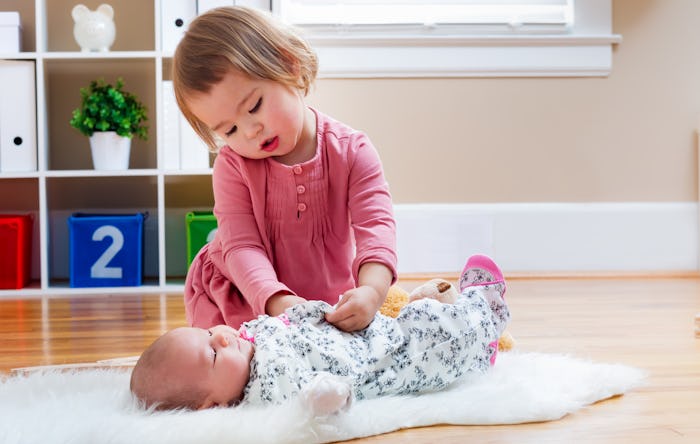Life

Toddlers Are Total Germ Magnets, So Here's How To Keep Their Baby Sibling Safe
This fall has been brutal on my family: Colds, sinus infections, stomach viruses, pink eye — you name it, one of us has caught it. And as the temps turn colder, the odds are our chances of catching something aren't getting any lower. I'm due to deliver a newborn any day now, and with a toddler in part-time day care, I'm already wondering how to keep my baby safe in the winter if my toddler is sick. So I reached out to one of my favorite pediatricians, who gave me some advice on if the new babe will have any chance at all of staying healthy.
According to Dr. Jarret Patton, pediatrician and physician coach, parents are not completely powerless over winter illness in our homes (despite how it sometimes feels). Hopefully we are already teaching our little ones about the importance of washing our hands regularly, and if our toddlers are old enough to understand intangible concepts, we can teach them about the spread of germs as well. When — let's face it, not "if" — your toddler does get sick, Dr. Patton says, "During the time of illness, it is important that your toddler understand why they shouldn't touch their loved sibling. This includes trying to keep them from sharing toys during the illness phase, as toys can spread the germs nearly as easily as direct touching."
The toys! Am I the only one who forgets what utter and complete germ magnets those things are? It's like I basically invite my children to inhale and lick each other's ailments. Even if your toddler and baby have vastly different interests and you assume they are playing with different types of things, the odds are there is quite a bit of accidental toy-sharing that still takes place. For this reason, Dr. Patton tells Romper, "Frequent cleaning of shared toys is a good idea." Simply wiping down playthings with a disposable disinfectant cloth at the end of the day can be a quick and easy way to keep sickness far from your littlest family member.
"It is also good practice to keep hand sanitizer nearby so that it can be used for both parent and toddler before interacting with the infant," advises Patton. Most of us are pretty vigilant about that discipline in the hospital and in the few weeks afterwards, but it's easy to forget as the weeks and months of baby's life go rolling by. Unfortunately, it's no less important at three months than at three days.
And although the topic may be controversial in some households, Patton's medical expertise urges parents to vaccinate our children. Since the immune systems of infants are still not developed enough to protect them the way an adult's is, vaccinations provide an important layer of health and safety. "Bacteria that cause Pertussis (whooping cough) and viruses like the influenza virus can have very severe consequences for infants prior to developing their own immunity against them," says Patton.
And this doesn't just go for the new baby, who can only receive so many vaccines for their age. "Having household members vaccinated against these pathogens can go a long way to protect baby," Patton reminds parents. If you tend to find yourself wary of vaccines, talk to your pediatrician about your concerns weighed against your lifestyle and exposure to outside germs (i.e. day care, church nursery, extended time with other families, to name a few).
If your toddler is already sick, the best thing you can do to keep your baby safe is to keep her away from her big sibling as often as possible and remember to clean, clean, clean. I'll be right there with you this winter with my hand sanitizer and disinfectant wipes, and we'll survive one way or the other. And just wait, before we know it, summertime and margaritas will be calling our name once again.
Check out Romper's new video series, Romper's Doula Diaries:
Watch full episodes of Romper's Doula Diaries on Facebook Watch.